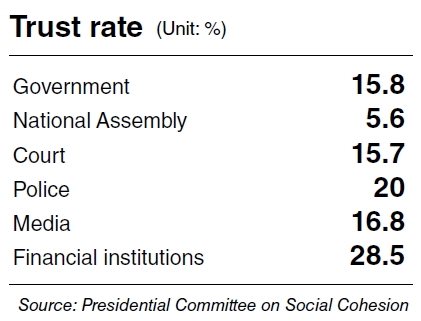
A government survey showed Thursday that Koreans harbor a deep distrust of the nation’s public institutions with the legislature rated the least trustworthy.
According to the survey released by the Presidential Committee on Social Cohesion, only 5.6 percent of 2,000 adults said they trusted the National Assembly while 72.8 percent said they did not.
Only 15 percent said they trusted the government while 46 percent said it did not do the right things, up nearly five percentage points from the previous survey two years ago.
Trust in the courts and the media were 15 percent and 16 percent, respectively, while financial institutions and police received 28.5 percent and 20 percent, respectively.
The poll also showed that the majority, 82 percent of respondents, saw social disparity as the most serious societal problem, followed by ideological divides and labor-management disputes at 63.8 percent and 63.7 percent, respectively.
In addition, nearly 27 percent respondents said that the government should pay more attention to low-income citizens for better social cohesion, followed by equal opportunity and mature civility of citizens at 25.8 percent and 20.2 percent, respectively.
Meanwhile, the Presidential Committee on Social Cohesion also reported that despite the country’s strong record of economic growth, the government had failed to reduce income inequality.
The committee noted that Korea ranked below the average of 34 Organization for Economic Cooperation and Development nations in social cohesion, which is measured by 14 indexes, such as poverty rate, suicide, unemployment rate and the Gini coefficient.
Korea’s relative poverty rate ― measured as the share of people who live on less than half the median income ― was nearly 15 percent of the total population, placing it 28th among the 34 OECD nations.
Also, the country had the highest suicide rate among OECD countries, with 33.5 people per 100,000 taking their lives in 2010, far higher than the average 12.5 people for OECD members.
The Presidential Committee advised the upcoming government to increase social spending.
“The poverty rate of the country is about 1.3 times higher than the OECD average, but the outlays for social spending are nearly 40 percent below the OECD average so it’s urgent to correct the situation,” the committee said in a statement.
By Oh Kyu-wook (
596story@heraldcorp.com)








